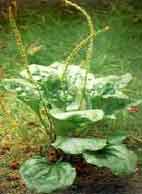Tuesday, February 22, 2011
Plantago major L., sacred medicinal plants with an abundance of benefits.
Plantago major L. trunked plant is a lot of damp which has a name. In Indonesia, this plant is called the ki urat, ceuli, meloh kiloh, otot-ototan, sangkabuah, sangkuah, sembung otot, suri pandak, daun urat. daun urat-urat, daun sendok, ekor angin, kuping menjangan, torongoat. While in other countries this plant also has its own name, among others, che qian cao (China), ma de, xa tien (Vietnam), weegbree (Netherlands), plantains, greater plantain, broadleaf plantain, rat's tail plantain, waybread, white man's foot (England).
Plantago major is a weed in plantations, or growing wild in the forests, fields, and lawns are a bit damp, sometimes also planted in pots as a medicinal plant. This plant originated from mainland Asia and Europe, can be found from lowland until height of 3300 m above sea level.
This plant, including interest Plantaginaceace, grow upright, height 15-20 cm. Leaves single, long stemmed, arranged in a rosette roots. Round leaf shape eggs until lancet wide, flat or jagged edges rough irregular, smooth or slightly hairy, leaf curved bone, the length of 50-10 cm, width 4-9 cm, it's green. Compound inflorescence composed of grains whose length is about 30 cm, small, white color. Fruit oblong or oval, containing 2-4 seeds are black and wrinkled.
Efficacy in the treatment of these plants are very numerous and have been known since ancient times. Even in Anglo Saxon, this plant is one of nine medicinal plants that are considered sacred by them. This herb is sweet and cold, into the kidney meridian, liver, small intestine and lung.
Plantago major contains chemicals such as plantagin, aukubin, ursolik acid, Beta-si-tosterol, n-hentriakontan, and plantagluside consisting of methyl D-galakturonat, D-galactose, L-arabinose and L-rhammosa. It also contains tannin, potassium and vitamins (B1, C, A). Potassium is shed the urine and dissolve the calcium salt deposits found in the kidneys and bladder. Aukubin active substances in addition to efficacious protect the liver against the effects of toxic substances that can damage liver cells (hepatoprotector), also efficacious antiseptic. Seed (che qian zi) of this plant contain planterolik acid, plantasan (with a composition of xylose, arabinose, and rharnnose galacturonat acid), protein, starch, aucubin, succinic acid, adenine, cholin, katalpol, syringin, fatty acids (palmitate, stearate, arakidat, oleic, linolenic and lenoleat), and Flavanone glycosides. While the roots contain naphazolin.
According to the research, ethyl acetate fraction (acid), Plantago major has antiuicer activity. Infusion of this plant has the effect of dissolving the calcium and magnesium from kidney stones, while the extract showed the antibacterial against Staphylococcus aureus and Shigella sonnei.
The part that is used as a treatment of this plant is the leaves, seeds, and roots. The leaves are used to treat urinary tract disorders such as urinary tract infections, urinary fatty, bloody urine, swelling due to kidney disease (nephrotic edema), pee a little because of the heat in, gallstones, kidney stones, prostatitis, influenza, fever, pertussis, bronchitis, diarrhea, dysentery, stomach pain, conjunctivitis, diabetes mellitus, acute jaundice hepatitis, intestinal worms, insect bites, and bleeding such as nosebleeds, coughing up blood. Seeds of this plant are used to treat gastrointestinal disorders in children (dyspepsia), stimulating desire (aphrodisiac), spermatorea, urinary pain (dysuria), difficulty urinating, a feeling of fullness in the lower abdomen, diarrhea, dysentery, intestinal worms, blurred vision, red eye, swelling and pain due to heat in the liver, cough with much phlegm, hypertension, jaundice, and rheumatic gout. While the root is used to treat vaginal discharge (leukore) and muscle pain.
In the treatment of dry leaves are usually 10 - 15 g or fresh leaves as much as 15-30 g of boiling water, then drink the water. Fresh leaves can also be ground and then squeezed and filtered for drinking. For the use of seeds, 10-15 g of seeds of Plantago major and drink boiled water. For external use, fresh leaves are crushed and applied on the wound bled, scalded, or boils, and then bandaged. Use can also be boiled with water to rinse his mouth on the sore gums and sore throat. Can also be used by way of finely ground, then made ointments to deal with boils, abscesses, and ulceration.



